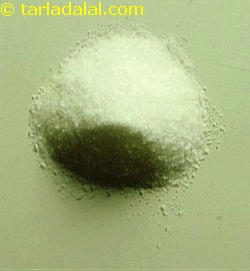
Also Known as
Ajinomoto, Mono sodium glutamate
Description
MSG is the salt version of glutamic acid. Glutamic acid is one of a chain of 20 amino acids that make up a protein molecule. It is a non-essential amino acid, which means that the body produces what is needed and we don't need to make it up in our diet. The brain uses glutamic acid as a neurotransmitter. Today, the MSG we find on store shelves is usually made from fermented sugar beet or sugar cane molasses, in a process quite similar to the way soy sauce is made.
It all comes down to our taste buds. It has long been known that there are four basic tastes - sweet, sour, salty, and bitter. It is now thought that there is a fifth taste, called "umami." Umami is the savory taste that occurs naturally in foods such as tomatoes and ripe cheese. Just as eating chocolate stimulates the sweet taste receptors on our tongue, eating food seasoned with MSG stimulates the glutamate or "umami" receptors on our tongue, enhancing the savory flavor of these foods. MSG has very little flavor of its own, but it 'improves' or enhances the flavor of other foods it is used with.
How to Select
Choose from the various brands available in the market. Purchase small packaging and buy often as required. Don't forget to check the manufacturing and expiry dates.
Culinary Uses
· MSG is used extensively in Chinese cooking as a flavouring agent. It can be used for any type of cuisine, be it Chinese, Indian, Continental etc…
· Throughout the food industry, MSG is becoming an increasingly popular way to add flavor to packaged foods such as soups, sauces, seasonings, and instant snacks.
· Ajinomoto is essentially used as a taste enhancer and is said to impart a sixth sense, described as savoury, in addition to the five basic tastes like sweet, spicy, bitter, sour and salty.
· When added to food it enhances the natural taste present in the food by bringing about a natural ripening process that brings out its full flavour.
· It could also be added at any stage of cooking.
How to Store
Store it in a cool dry place, with the lid sealed properly.
Health Benefits
· Monosodium glutamate as a food ingredient is the subject of a health concern controversy.
· MSG symptom complex - may include: Headache, sometimes called MSG headache, Flushing, Sweating, Sense of facial pressure or tightness Numbness, tingling or burning in or around the mouth, Rapid fluttering heartbeats (heart palpitations), Chest pain Shortness of breath, Nausea, Weakness.
· Large amounts of MSG may cause arterial dilation (widening of arteries).
· It is better advised to use it sparingly and in moderate amounts.